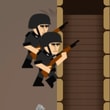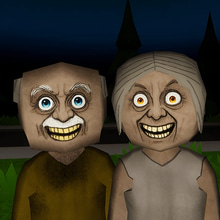 Schoolboy and G
Schoolboy and G
Advertisement
..Loading Game..


The Road Home: Granny Escape
Advertisement
Advertisement
More Games
Play : The Road Home: Granny Escape 🕹️ Game on Kiz10
Whispers in the dark 👁️ The house breathes like an animal that hasn’t decided whether to swallow you or spit you back out. Doors mutter when they settle, floorboards confess secrets under your steps, and somewhere beyond the stairwell a clock pretends time is still sane. The Road Home: Granny Escape is not about running fast. It’s about thinking faster than the old eyes that patrol the halls, and quieter than your fear. You wake cuffed to silence, with the metallic taste of panic and the instant understanding that noise is treason. In this survival horror, stealth is oxygen. One scrape, one clink, one badly placed bottle and the night blossoms with footsteps that are not yours.
Hunted by habits, not monsters 🕯️ The danger here is routine made predatory. Granny and her partner move like rituals, checking cupboards, windows, and the suspicious air left behind when a drawer isn’t exactly where it used to be. They respond to sound, to light, to the soft complaint of a hinge. If you must cross the living room, you wait for the teapot whistle in the kitchen to spike their attention, then drift ten steps like a shadow that forgot it belonged to something. The game teaches a brutal respect for small choices. Close the door? That click might pull them back. Leave it ajar? Drafts nudge it, wood taps wood, and everything listens.
Scavenge, stitch, survive 🧰 You’ll start with pockets that feel insultingly empty, but the house is generous in the way a storm is generous with rain. Nails, wire, rags hardened by time, a stubborn screwdriver buried under old newspapers—each piece is useless alone and miraculous together. Crafting is not a chore list; it’s a quiet conversation with the environment. A length of wire and a fork become a makeshift lockpick that respects no door. Cloth, alcohol, and guts form a silent bandage that steals the drama out of bleeding. Battery scraps feed a dying flashlight, and a bottle with a few pebbles turns into a mobile thunderclap—toss it far, count to three, move. The best recipes here aren’t just practical; they are psychological warfare. A wind chime in the wrong hallway becomes your ally; a jammed music box becomes a timed distraction that buys you thirty steps of grace.
Rooms that remember you 🗝️ Every corridor feels hand-drawn for caution. The cellar smells like rust and apologies, the attic has air that tastes like old moths and dusted memories, the pantry is a maze of glass things that can betray you with one impatient elbow. You’ll learn them the way a prisoner learns the rhythm of guards—the exact creak before the study door opens, the stretch of shadow where you can fold yourself and stop existing. Puzzles never stop the story; they braid into it. A portrait with eyes that misalign by a degree is not just creepy—it’s a map if you notice the mischief. A row of books that won’t sit flush hides a lever. A series of numbers scrawled on recipe cards flips into a code if you align the spice jars by their stains. The joy isn’t in solving a puzzle; it’s in solving it before footsteps bloom behind you.
Sound is a blade, silence the sheath 🔊 Horror lives in decibels here. You study the language of the house until you speak it like a native. Footsteps on tile carry farther than wood. A dropped nail in the basement is a gunshot in the kitchen. Rain on the roof forgives mistakes; thunder grants you diplomatic immunity for three seconds. If you breathe near the old phonograph, it answers with a sigh that travels. You will learn to game the acoustics: time a drawer slam with passing thunder, open the patio door so the wind sabotages your trail, let the grandfather clock swallow the click of a lockpick. The game isn’t punishing; it’s honest. When you make noise, it draws eyes. When you respect the air, the air protects you.
Predators with patterns, minds, and moods 👣 Granny’s partner doesn’t simply path; he suspects. He’s the type to revisit a room you just left because something smells wrong in the geometry. He notices lights that weren’t on. He mutters when he finds footprints in a dust field you thought was harmless texture. Granny hears the memory of sound: if you sprinted an hour ago, she’ll loiter in that hallway later, impatient for lightning to show her what ears already promised. This isn’t supernatural omniscience; it’s a simulation of human habit weaponized. Outsmarting them feels earned. When your plan works—when you throw a bottle into the pantry, thread the study, and slip behind the armoire as keys clatter in the wrong place—you feel like you pulled wisdom out of thin air.
Fear as a tutor, not a jailer 🧠 The first hour, you tiptoe. The second hour, you plan. By the third, you’re orchestrating a quiet opera. You stack distractions on fragile timings: a kettle left to screech, a fuse box you flip twice to sow confusion, a door you leave nearly shut so the draft finishes the job when someone passes. Terror becomes a tool belt. The house, so intimidating at first, turns into a board you read at a glance. And yet the unease never dies. Even when you own the map, you don’t own the shadows. That’s the magic: mastery without immunity.
Moments you’ll tell yourself later 🔦 There’s the descent where your flashlight gives a half-breath heartbeat before dying, synchronized perfectly with thunder, and you move because doing nothing would make your bones rattle loud enough to alert the furniture. There’s the puzzle where the family recipe for lemon bars is actually coordinates to shift floor tiles in the dining room. There’s the moment you realize the mirror in the upstairs hall isn’t a mirror if you angle the light just so, and what you thought was your reflection is a shy doorway to a crawlspace full of forgotten chatter. You’ll get stuck. You’ll grin when you get unstuck. And you’ll swear, loudly, when the floorboard you’ve crossed a dozen times suddenly gives you an out-of-tune complaint that turns the whole house toward you.
Why you keep coming back 🏚️ Because the loop never feels like a loop. New seeds rewire the house: drawers reshuffle, keys migrate, footsteps get bolder, and that one hidey hole that used to save you starts feeling crowded. Crafting strategies evolve, too. Maybe you begin as a hoarder, then graduate to a minimalist ghost. Maybe you once walked with light and now you stalk by memory, counting steps and edges. The Road Home is a promise that stealth games can feel personal again, that survival horror can be orchestral without drowning you in systems. It’s a game that asks for attention and pays you back with those delicious tiny victories only you will ever notice.
Final step to daylight 🌫️ Escape is not a single door; it’s a chain of smart compromises. You won’t blaze out. You’ll peel the house off yourself like old wallpaper, strip by strip, until the front porch becomes a concept you can believe in. When dawn finally stitches color into the world, it’s not triumph you feel first. It’s quiet. The good kind. The kind you earned with patience, curiosity, and the kind of cunning that turns fear into an ally. Then you exhale, and the house exhales too, and you realize the road home was never just outside. It was the path you built in your head, one silent decision at a time. Play it on Kiz10 when you crave stealth, crafting, and cold-blooded puzzle solving that rewards minds over muscles.
3: FAQ:
How do I stay undetected early on? Move slowly, crouch near creaky surfaces, and use environmental noise to mask actions. In this stealth horror experience, speed kills; patience wins. Break line of sight, then change floors. Keywords: stealth, line-of-sight, noise masking.
How do I stay undetected early on? Move slowly, crouch near creaky surfaces, and use environmental noise to mask actions. In this stealth horror experience, speed kills; patience wins. Break line of sight, then change floors. Keywords: stealth, line-of-sight, noise masking.
What crafting items should I prioritize? Focus on lockpicks, bandages, and distraction tools first. A battery patch for your flashlight matters less than a guaranteed silent escape. Keywords: crafting, lockpick, bandage, distraction.
Do enemies truly react to sound and light? Yes. Footsteps on tile carry farther, doors clicking attract patrols, and sudden light draws investigation. Use thunder, kettles, and radios to hide critical moves. Keywords: AI detection, sound design, dynamic patrols.
Are puzzles timed or purely logical? Most puzzles sit inside stealth loops. They’re logical but pressure tested by patrol routes. Read patterns, memorize creaks, and align clues while planning exits. Keywords: puzzle solving, environmental clues, route planning.
Any tips for consistent escapes? Create a two-path plan: a primary route and a backup pocket route with a pre-placed distraction. Don’t hoard tools—spend them to buy silence at the right moments. Keywords: escape route, resource management, survival strategy.
Similar games on Kiz10 you might enjoy:
Granny
Granny Original
Scary BanBan Escape
Scary Lab Escape
Escape the Backrooms: MISIDE.EXE Game
Granny
Granny Original
Scary BanBan Escape
Scary Lab Escape
Escape the Backrooms: MISIDE.EXE Game
Advertisement
Controls
Controls























































